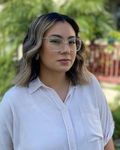2022
Lucha Arévalo
- Assistant Professor
- Río Hondo College

Abstract
This project focuses on the growing collection of anti-racist children’s books produced by students who enroll in the course CHST 101: Introduction to Chicana/o/x Studies at Río Hondo College, a Hispanic-serving institution. CHST 101 is a course that focuses on the study of Chicanx/Latinx communities while holistically developing an understanding of race, ethnicity, class, gender, sexuality, and power in American society. This interdisciplinary project centers on the Anti-Racist Children’s Literature (ACL) curriculum created by Dr. Arévalo, which critically examines issues of multiculturalism in children’s literature while empowering students to civically engage in anti-racist work through the production of an original children’s book. The anti-racist children’s books created by students are essential to the fight against racism in America, just as are the artists, poets, writers, and cultural content creators who allow us to imagine differently. Support for this project makes possible partnerships with the campus library and child development center to promote anti-racist children’s literature in general, and to sustain the children’s books created by Chicanx Studies students specifically. Simultaneously, this project creates avenues for the curriculum and its developments to be shared with academic and public audiences.
Abstract
The grant shall sustain twelve months of public programming between the Mesoamerican Clay-Figurine Project and its partners. The 2022-23 program involves three public forums hosted at the East Side Café, a Zapatista-Maya inspired community center in El Sereno. These forums shall be followed-up by one public book reading with a live Q&A part hosted by the Los Angeles Indigenous People’s Alliance. To cap the programming, one public health symposium will be held at the Association of Raza Educators headquarters in Los Angeles. These five public meetings shall feature public intellectuals instructed to lead the co-creating and sharing of knowledge in the areas of racial equity, educational sovereignty, and public health. Santiago Andres Garcia, Professor of Anthropology (Rio Hondo), and Lizette “Lucha” Arévalo, Assistant Professor of Chicana/o/x Studies (Rio Hondo) shall steer the yearlong efforts.

